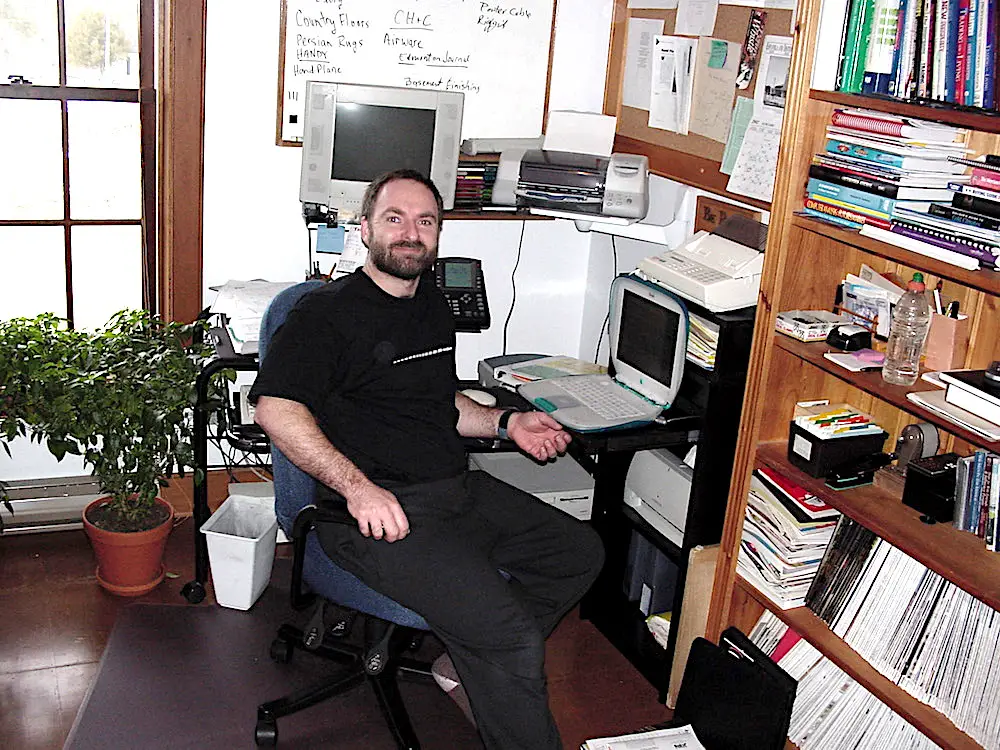Are you interested in developing a more stable, more enjoyable and more flexible work life earning money at home doing something you love? I’ve been working like this, almost entirely at home, for 30+ years and this has been vital to the success of my family’s life here on Manitoulin Island, Canada. If you feel the urge to do the same, I’ve got a story to tell, some advice to offer and an invitation to join me for an online seminar and coaching session about earning a living online from anywhere beginning on April 15th.
- Reading Time = 7 1/2 minutes
How It Began For Me
When I first began earning a living from home it was the late 1980s, and no one else that I knew was doing anything like the same thing. That was just about the time I moved from the city to the country, and I remember hearing more than one piece of second-hand gossip from the rural locals about how this Steve Maxwell guy earned a living. “I think he sells drugs”, one persistent rumour had it. “How else does a guy in his 20s keep buying stuff with no visible job? He doesn’t work!” That’s me below, in 2002, in the office I’d set up in one bedroom o my house.
Well, actually, I did work (about 60 hours a week back then), so eventually, word got around that I wasn’t selling drugs after all, but rather “writing”. That’s a catch-all phrase that didn’t mean a lot on its own then (even less now), but at least it was closer to the mark and not illegal. Eventually, as more and more people got a sense of the work I did, more and more people began asking me some version of the same question: “How can I earn money from home, like you do?” And whenever I get this question, I always begin to answer with a question of my own.

Two Paths to Online Work
What kind of work do you want to do? As I mentioned before, working online from home is fundamentally no different than working a regular job away from home. You need to produce something of value that other people are willing to pay for, but how you go about structuring this yourself takes two somewhat different forms.
The Remote Employee Approach: This arrangement has you doing work for an existing company on their terms and usually on their daily schedule as an employee. It’s exactly like working as a conventional employee, except that instead of having to commute to a computer and desk in some office space that you travel to, you have a computer and desk at your home (or wherever you can open a laptop). Since COVID, a huge part of the workforce has had to take on this kind of work, but even before COVID most of the people I knew who worked from home did it this way, as an employee. I have a neighbour, for instance, who moved from the big city out here to the country, and he brought his job with him. He used to go to the office every day before he moved, now he never does because he lives 600 miles away from the office. These days companies everywhere are more open than ever to hiring remote employees. The COVID lockdowns have shown the corporate decision makers that remote employees not only can work, but it saves them money, too. The remote employee model has both benefits and drawbacks, as I’ll explain later with a quick pro/con analysis.
The Boss-Free Approach: This means you’re your own boss and that you succeed or fail on your ability to drum up work for yourself, complete that work profitably, then find more work, etc. As usual with life, the self-employment option is scarier because you don’t have a boss creating work for you. You sink or swim on your own. On the upside, the earnings potential is higher with the self employment model, and your work life will probably have more freedom because you don’t have to follow the “boss’s schedule”. I’ve always worked using the self-employment approach, but it’s not for everyone. Here’s a pro/con analysis of the two approaches:
Remote Employee Approach
Pros:
- easier to begin earning money sooner than with self-employment model
- no need to win clients
- worker benefits depending on your boss and company
Cons:
- probably need to work to your boss’s schedule
- less money more likely than the self-employment model
- the equipment you buy for your work is not tax deductible
Boss-Free Approach
Pros:
- complete freedom to work whenever and wherever you want according to your own schedule
- greater profit potential than employee model, all else being equal
- you can deduct the expenses of computers, cables, hard drives and cameras, plus the cost of business travel and accommodation if you do travel for work
Cons:
- you sink or swim on your own ability to make work happen
- takes time to get work relationships created and working
- the need to arrange you own benefits packages/health insurance/dental etc.
In practice, most people who feel the urge to work from home already have a job as an employee. That’s probably you, right? Keep your job, but work in your spare time to find a part-time employment opportunity that can be done from home. Either way, the end goal is to earn, so make sure your employer or client doesn’t miss any payments by using an invoice template. Efficiency is vital when working on your own, and the faster the invoicing process the better. There’s no need to take any big leaps of financial risk unless you want to, but here’s something else to consider, something quite important. It has to do with your personal work ethic.

Getting the Airplane Off the Ground
How do you feel about working over-and-above the hours you already spend at your job (if you have one)? Your answer to this is key because it gets down to your personal work ethic and your desire to make changes. It’s virtually guaranteed that you will need to put in substantially more work hours than you are now, to get things off the ground. Think of this venture like an airplane taking off. If you’ve ever experienced this you know that aircraft engines are always cranked up full blast initially because it takes so much energy to get off the ground. Your work-from-anywhere career is similar. Success depends on your willingness to push the throttle to the max when conditions require it. Motivation is a big thing in all this, and I’ll be talking more about motivation later. In the mean time, let me leave you with something to think about. It’s important you attempt this work-from-anywhere thing for the right reasons, so let’s look at a few of the wrong reasons.
Five Top Reasons NOT to Attempt to Work Remotely
1. My work will be easier!
Well, this may, in fact, turn out to be the case in time, but don’t count on it – especially at the beginning. The main attraction of working from anywhere is the flexibility it offers, not necessarily the ease. Expect to work hard and not make much headway at first.
2. I’ll make more money!
Once again, this is entirely possible in time (it has been true for me), but expect to take something of a pay cut while you’re learning how everything works and how to avoid mistakes. In my own experience, my hourly earnings from the first boss-free work I did (that was back in November 1988) matched my hourly rate as a carpenter on commercial construction projects, and it has gone up from there since then. Boss-free arrangements have enormously more earning potential than remote employee arrangements in my experience.
3. I won’t have to deal with troublesome people!
Perhaps, but you might be surprised to learn that you like being around people and the office situation more than you thought. It depends on your personality. I’m just as happy being alone all the time as I am in a group, so I’m completely content going for weeks at a time without seeing anyone beyond my immediate family. Any way you slice it, isolation is something you may have to deal with.
Next time I’ll talk more about motivation, skills acquisition and the mental attitude necessary to succeed working from anywhere. This isn’t about mental attributes that you must have naturally, but rather mental attributes you must be willing to develop. I’ve had to develop many, as you’ll see. Just one more thing . . . by necessity I’m talking about broad-stroke concepts here, and I will need to keep doing that for a while. Rest assured that eventually I’ll be getting down to some very granular, very specific practical things. All in good time.
Want to learn more? Check out Three Truths of Online Income. This is vital information, but few people seem to understand it.
 Did you find this useful? I hope so. We’ll be covering lots of stuff in detail during the two-session online learning camp on April 15 and 22. People are continuing to join and I’d love to show you how you can enjoy a much better work like than average.
Did you find this useful? I hope so. We’ll be covering lots of stuff in detail during the two-session online learning camp on April 15 and 22. People are continuing to join and I’d love to show you how you can enjoy a much better work like than average.




